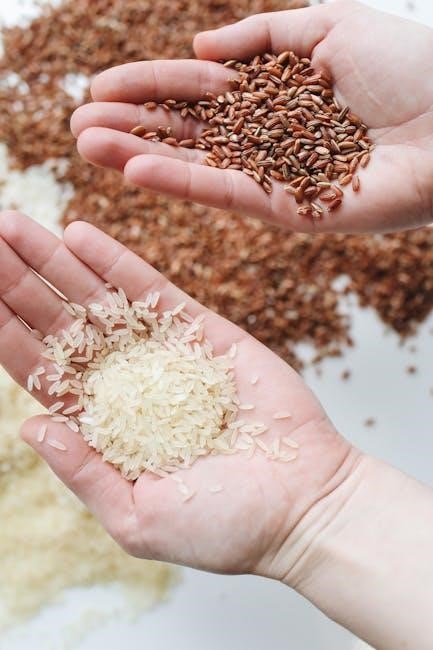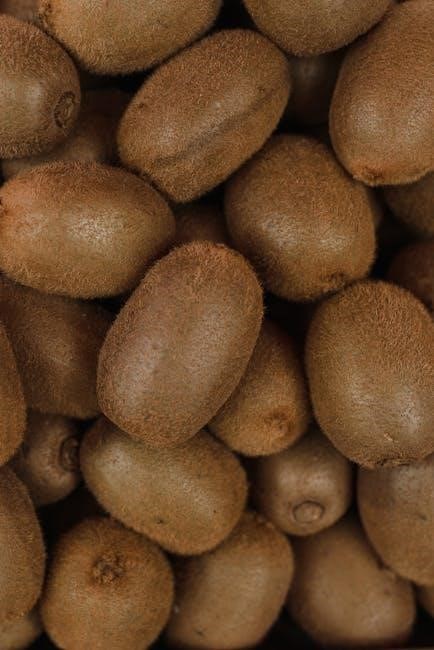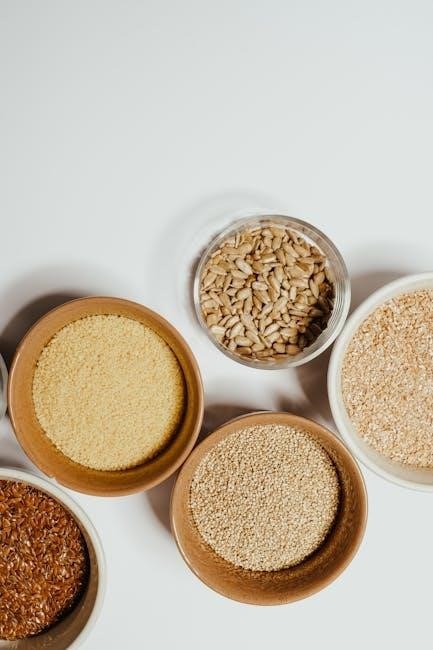A free PCOS diet plan PDF offers a structured approach to managing symptoms through nutrition․ It provides meal guides, recipes, and tips to balance hormones and improve health․
1․1 What is PCOS?
Polycystic Ovary Syndrome (PCOS) is a hormonal disorder affecting women of reproductive age․ It is characterized by irregular periods, ovarian cysts, and hyperandrogenism․ Symptoms include weight gain, acne, and excess hair growth․ PCOS is linked to insulin resistance, inflammation, and metabolic issues․ If untreated, it can lead to long-term health complications like diabetes and cardiovascular disease․ Managing PCOS often involves lifestyle changes, including diet, exercise, and stress reduction․ A well-structured PCOS diet plan can help alleviate symptoms, improve hormone balance, and enhance overall well-being․ Early diagnosis and personalized approaches are key to managing this condition effectively․
1․2 Importance of Diet in Managing PCOS
Diet plays a crucial role in managing PCOS by addressing insulin resistance, hormonal imbalances, and inflammation․ A well-structured diet helps stabilize blood sugar, improve insulin sensitivity, and promote weight management․ It also supports hormone regulation, reducing symptoms like acne and excess hair growth․ Eating anti-inflammatory foods and avoiding processed sugars can further alleviate discomfort․ A tailored diet plan is often the first step in PCOS management, offering a natural and effective way to enhance fertility, improve metabolic health, and boost overall well-being․ Consistency in dietary habits is essential for long-term symptom control and better quality of life․
1․3 Benefits of a Free PCOS Diet Plan PDF
A free PCOS diet plan PDF provides accessible, actionable guidance for managing symptoms․ It offers structured meal plans, recipes, and grocery lists, helping users stabilize blood sugar and improve insulin resistance․ The PDF format allows for easy access on-the-go, making meal planning convenient․ It often includes tips for balancing hormones and reducing inflammation, empowering women to take control of their health․ With a focus on sustainable, long-term changes, a free PCOS diet plan PDF is an invaluable resource for those seeking to alleviate symptoms and enhance overall well-being without additional costs or complexity․
Understanding PCOS and Its Impact on Health
Polycystic Ovary Syndrome (PCOS) is a hormonal disorder causing irregular periods, infertility, and metabolic issues․ It impacts health by increasing diabetes and heart disease risks․
2․1 Common Symptoms of PCOS
Common symptoms of PCOS include irregular menstrual cycles, cysts on the ovaries, weight gain, and excessive hair growth․ Many women experience hormonal imbalances, acne, and fertility issues․ Symptoms vary widely among individuals, with some also facing insulin resistance and metabolic challenges․ These symptoms stem from high androgen levels and insulin resistance, which can lead to long-term health complications if left unmanaged, such as type 2 diabetes and cardiovascular disease․ Early diagnosis and lifestyle changes, including dietary adjustments, are crucial for managing these symptoms effectively․
2․2 How Diet Affects PCOS Symptoms
Diet plays a significant role in managing PCOS symptoms by influencing blood sugar levels, insulin resistance, and inflammation․ A high-fat, low-carb diet can help stabilize blood sugar and improve insulin sensitivity, reducing the risk of metabolic complications․ Anti-inflammatory foods, such as leafy greens and fatty fish, can decrease inflammation, while avoiding processed foods and added sugars helps mitigate hormonal imbalances․ A well-structured diet not only aids in weight management but also supports hormonal balance, improving fertility and reducing acne and excess hair growth․ By making informed dietary choices, women with PCOS can alleviate symptoms and enhance overall well-being․
2․3 The Role of Insulin Resistance in PCOS
Insulin resistance is a common feature of PCOS, leading to high blood sugar and insulin levels, which can cause weight gain and metabolic issues․ This condition often worsens PCOS symptoms, such as acne and excess hair growth․ A diet focused on stabilizing blood sugar and improving insulin sensitivity can help manage these issues․ By avoiding sugary and processed foods and incorporating anti-inflammatory and low-carb options, women with PCOS can reduce insulin resistance; This dietary approach not only aids in weight loss but also promotes hormonal balance, improving overall health and symptom management․
2․4 Weight Management and PCOS
Weight management is critical for women with PCOS, as excess weight can worsen insulin resistance, inflammation, and hormonal imbalances․ Even a modest weight loss of 5-10% can improve symptoms like irregular cycles, acne, and excess hair growth․ A structured PCOS diet plan focuses on nutrient-dense, low-carb, and anti-inflammatory foods to promote sustainable weight loss․ Portion control, mindful eating, and regular physical activity are key․ By addressing weight, women with PCOS can enhance fertility, reduce metabolic risks, and improve overall health․ A well-designed meal plan, often available in free PDF guides, provides practical tools for achieving and maintaining a healthy weight․

The Best Diet for PCOS
The best PCOS diet focuses on blood sugar balance, insulin sensitivity, and anti-inflammatory foods․ High-fat, low-carb, and Mediterranean approaches are often recommended to manage symptoms effectively․
3․1 High-Fat, Low-Carb Diet for PCOS
A high-fat, low-carb diet is often recommended for PCOS management․ By reducing carbohydrate intake, it helps stabilize blood sugar levels and improve insulin sensitivity․ This approach promotes weight management and hormonal balance․ Foods like avocados, nuts, and olive oil are emphasized, while sugary and processed carbs are limited․ The diet focuses on whole, nutrient-dense foods to support overall health and reduce inflammation․ Many women with PCOS find this dietary strategy effective in alleviating symptoms and enhancing fertility․ It’s a practical way to manage PCOS through dietary adjustments․
3․2 Mediterranean Diet and Its Benefits for PCOS
The Mediterranean diet is a highly recommended approach for managing PCOS․ It focuses on whole, unprocessed foods like fruits, vegetables, whole grains, lean proteins, and healthy fats, such as olive oil․ This diet helps reduce inflammation, improve insulin sensitivity, and promote hormonal balance․ By eliminating processed foods and added sugars, it supports weight management and enhances fertility․ The Mediterranean diet’s emphasis on antioxidants and anti-inflammatory nutrients makes it an ideal choice for women with PCOS, offering long-term health benefits and symptom relief․ Its flexibility and focus on nutrient-dense meals make it a sustainable option for PCOS management․
3․3 Anti-Inflammatory Foods for PCOS
Anti-inflammatory foods play a crucial role in managing PCOS symptoms․ Focus on consuming leafy greens, berries, and fatty fish, which are rich in antioxidants and omega-3 fatty acids․ Whole grains, lean proteins, and healthy fats like olive oil also help reduce inflammation․ Incorporating turmeric, ginger, and green tea can further enhance anti-inflammatory effects․ Avoid processed foods, sugary drinks, and refined carbohydrates, as they can worsen inflammation․ A diet rich in these foods supports hormonal balance, improves insulin sensitivity, and aids in weight management, making it a cornerstone of a PCOS-friendly diet plan․ Prioritize nutrient-dense, whole foods to combat inflammation effectively․
3․4 Foods to Avoid for PCOS Management
For effective PCOS management, it’s essential to avoid sugary foods, refined carbohydrates, and processed foods, as they worsen insulin resistance and inflammation․ Limit saturated fats, red meat, and excessive caffeine, which can disrupt hormonal balance․ Avoid alcohol and sugary drinks, as they contribute to weight gain and inflammation․ Refined grains and high-glycemic foods should also be minimized to stabilize blood sugar levels․ These dietary adjustments help reduce inflammation, improve insulin sensitivity, and support overall hormonal health, making them critical components of a PCOS-friendly diet plan․ Focus on replacing these foods with anti-inflammatory, whole, and nutrient-rich options to better manage symptoms․

Creating a PCOS-Friendly Meal Plan
Creating a PCOS-friendly meal plan involves balancing macronutrients, focusing on whole foods, and timing meals to stabilize blood sugar and improve insulin sensitivity for better symptom management․
4․1 Step-by-Step Guide to Building a PCOS Meal Plan
Building a PCOS meal plan starts with setting goals, like improving insulin resistance or weight management․ Assess your dietary needs and preferences, then focus on whole, nutrient-dense foods․ Prioritize high-quality proteins, healthy fats, and low-carb vegetables․ Plan meals around blood sugar stabilization, ensuring balanced macronutrients at each sitting․ Incorporate anti-inflammatory foods and avoid triggers like refined sugars․ Utilize a PCOS diet plan PDF for structured guidance, including recipes and grocery lists․ Finally, monitor progress and adjust as needed to maintain long-term success and symptom relief․
4․2 Sample 7-Day PCOS Diet Plan
A sample 7-day PCOS diet plan focuses on balanced meals to stabilize blood sugar and improve insulin sensitivity․ Breakfasts include options like scrambled eggs with spinach or Greek yogurt with berries․ Lunches feature grilled chicken salads or turkey lettuce wraps․ Dinners emphasize lean proteins such as salmon or turkey, paired with roasted vegetables․ Snacks like nuts or avocado slices are encouraged․ The plan avoids refined carbs and sugars, promoting whole, anti-inflammatory foods․ A free PCOS diet plan PDF often includes this structured approach, providing clear guidelines for each day to help manage symptoms effectively and support overall health․
4․3 Grocery List for PCOS Diet
A PCOS-friendly grocery list focuses on whole, nutrient-dense foods․ Include proteins like eggs, lean meats, and fish․ Healthy fats such as avocados, nuts, and olive oil are essential․ Vegetables like leafy greens, broccoli, and bell peppers should be stocked․ Low-carb options like cauliflower rice and zucchini noodles are great substitutes․ Dairy can include Greek yogurt and cheese․ Herbs and spices add flavor without added sugar․ Avoid processed foods, sugary snacks, and refined carbohydrates․ A well-organized grocery list ensures adherence to the PCOS diet plan, helping manage symptoms and improve overall health․
4․4 Meal Prep Tips for PCOS
Meal prepping is essential for managing PCOS symptoms․ Start by planning meals weekly, focusing on balanced macros and anti-inflammatory foods․ Chop vegetables and marinate proteins in advance to save time․ Use storage containers to keep meals fresh for up to 3-4 days․ Incorporate grab-and-go options like salads or overnight oats for busy days․ Avoid processed foods by prepping whole ingredients․ Staying organized with a meal prep schedule helps maintain consistency, ensuring blood sugar stability and hormone balance․ This approach simplifies healthy eating, making it easier to stick to your PCOS diet plan long-term․

Free PCOS Diet Plan PDF Resources
Discover downloadable PDFs offering detailed meal plans, recipes, and grocery lists tailored for PCOS management․ These resources provide structured guidance for improving symptoms and overall health․
5․1 Where to Download a Free PCOS Diet Plan PDF
Access free PCOS diet plan PDFs through reputable health websites, PCOS-focused platforms, and online communities․ Websites like Healthline, PCOS Awareness Association, and nutrition blogs often offer downloadable guides․ Search for “free PCOS diet plan PDF” to find resources․ Many registered dietitians and wellness experts provide complimentary meal plans to help manage symptoms․ Additionally, join PCOS support groups or forums where members share downloadable resources․ Ensure the source is credible to receive accurate and safe dietary advice tailored for PCOS management․ These PDFs typically include meal plans, recipes, and grocery lists to support your health journey․
5․2 How to Customize Your PCOS Diet Plan
Customizing your PCOS diet plan involves tailoring it to your specific needs and preferences․ Start by assessing your health goals, such as weight loss or improved insulin sensitivity․ Consult with a healthcare provider or dietitian to create a personalized plan․ Adjust macronutrient ratios, such as increasing protein or reducing carbs, based on your body’s response․ Incorporate foods that suit your lifestyle and dietary preferences, ensuring variety to prevent boredom․ Regularly track your symptoms, energy levels, and progress to make necessary adjustments․ This approach ensures the diet plan remains effective and sustainable for long-term PCOS management․
5․3 Benefits of a PDF Format for PCOS Diet Plan
A PDF format for a PCOS diet plan offers numerous benefits․ It is easily downloadable and portable, allowing access on any device․ The structured layout ensures clarity and organization of meal plans, recipes, and tips․ PDFs are customizable, enabling users to annotate or adjust plans according to their needs․ They also provide offline accessibility, making it convenient for on-the-go use․ Additionally, PDFs often include bonus resources like grocery lists and meal prep guides, enhancing the overall value․ This format is ideal for long-term reference and sharing, making it a practical tool for managing PCOS effectively․

The Science Behind the PCOS Diet
The PCOS diet focuses on balancing hormones, improving insulin sensitivity, and reducing inflammation through tailored nutrition, supported by scientific research and proven health benefits for symptom management․
6․1 Balancing Hormones Through Diet
Diet plays a crucial role in balancing hormones for women with PCOS․ By focusing on whole, nutrient-dense foods, individuals can support hormonal equilibrium․ Foods rich in omega-3 fatty acids, such as salmon and flaxseeds, help reduce inflammation, which is often linked to hormonal imbalances․ Additionally, fiber-rich foods like leafy greens and berries assist in regulating estrogen levels․ Avoiding processed sugars and refined carbohydrates can also stabilize insulin levels, indirectly supporting hormone balance․ A structured PCOS diet plan PDF often includes these dietary recommendations to help women achieve and maintain hormonal harmony naturally․
6․2 Improving Insulin Sensitivity with Diet
Improving insulin sensitivity is vital for managing PCOS․ A diet low in refined carbohydrates and high in fiber can help regulate blood sugar levels․ Foods like whole grains, vegetables, and legumes slow sugar absorption, enhancing insulin function․ Healthy fats, such as avocados and nuts, also support insulin sensitivity․ Anti-inflammatory foods, including fatty fish and berries, reduce inflammation that can worsen insulin resistance․ By focusing on these dietary adjustments, women with PCOS can better regulate their insulin levels, promoting weight management and overall metabolic health․ A structured PCOS diet plan PDF often highlights these strategies for optimal insulin balance․
6․3 Reducing Inflammation Through Nutrition
Nutrition plays a key role in reducing inflammation, a common issue in PCOS․ An anti-inflammatory diet focuses on whole, unprocessed foods like leafy greens, berries, and fatty fish, which are rich in antioxidants․ Omega-3 fatty acids found in salmon and flaxseeds help combat inflammation․ Avoiding refined sugars, processed foods, and saturated fats is crucial, as they can exacerbate inflammation․ Incorporating turmeric, ginger, and other anti-inflammatory spices can also support healing․ By adopting these dietary strategies, women with PCOS can reduce inflammation, improve symptoms, and enhance overall well-being․ A PCOS diet plan PDF often emphasizes these anti-inflammatory food choices for better symptom management․
Success Stories and Testimonials
Women with PCOS share inspiring journeys of symptom improvement and enhanced well-being through tailored diet plans․ Testimonials highlight improved fertility, weight loss, and better hormonal balance․
7․1 Real-Life Experiences with PCOS Diet Plans
Women with PCOS share their journeys of transformation, highlighting how structured diet plans improved their symptoms․ Many report significant weight loss, better hormonal balance, and enhanced fertility․ A 7-day PCOS diet plan, often downloaded as a free PDF, has been a game-changer for many, offering clear guidance on meals and portion control․ Testimonials reveal improved insulin sensitivity, reduced inflammation, and increased energy levels․ These real-life stories emphasize the importance of consistency and the positive impact of tailored nutrition on overall well-being, inspiring others to embrace dietary changes for managing PCOS effectively․
7․2 Testimonials from Women Who Followed the PCOS Diet
Women who followed the PCOS diet plan shared inspiring testimonials, highlighting life-changing results․ Many reported significant weight loss, improved hormonal balance, and enhanced fertility․ One woman shared, “After following the 7-day PCOS diet plan, I lost 10 pounds and saw my cycles regulate․” Another testified, “The structured meal plan helped me manage insulin resistance and reduce inflammation․” These success stories underscore the practical benefits of the PCOS diet, emphasizing how accessible resources like the free PDF meal plan can empower women to take control of their health and thrive despite PCOS challenges․
Maintaining a PCOS Diet Long-Term
Maintaining a PCOS diet long-term requires consistency, patience, and a commitment to healthy habits․ Regular meal prep, tracking progress, and seeking support can help sustain weight loss and hormonal balance․
8․1 Strategies for Sustained Weight Loss
Sustained weight loss in PCOS requires a combination of dietary adjustments, portion control, and regular physical activity․ Incorporating high-fat, low-carb meals and anti-inflammatory foods helps stabilize blood sugar and reduce cravings․ Staying hydrated, managing stress, and ensuring adequate sleep are also critical․ Meal prepping and tracking progress can maintain consistency․ Gradual changes rather than quick fixes promote long-term success․ Regular health check-ups and adjusting the diet plan as needed further support weight management․ A structured approach, along with emotional support, helps women with PCOS achieve and maintain a healthy weight, improving overall hormonal balance and well-being․
8․2 Overcoming Challenges in PCOS Diet
Common challenges in following a PCOS diet include food cravings, social pressures, and time constraints․ To overcome these, focus on gradual changes and mindful eating․ Substitute unhealthy choices with nutrient-rich alternatives, like swapping refined carbs for whole grains․ Meal prepping can save time and reduce stress․ Building a support system, such as joining PCOS communities, can also help stay motivated․ Additionally, setting realistic goals and celebrating small victories fosters a positive mindset․ Remember, consistency is key, and even slight improvements can lead to long-term benefits for hormonal balance and overall health․
8․3 The Importance of Consistency in PCOS Management
Consistency is vital in managing PCOS effectively․ Regular adherence to a structured diet plan helps stabilize blood sugar levels, improve insulin sensitivity, and promote hormonal balance․ Over time, consistent habits reduce inflammation and support weight management, enhancing fertility and overall well-being․ Even small, steady efforts can lead to significant long-term improvements․ By sticking to a PCOS-friendly diet and lifestyle, women can better control symptoms and achieve lasting health benefits, making consistency a cornerstone of successful PCOS management․
Additional Resources for PCOS Management
Explore additional resources like guides, workout plans, and educational materials to support your PCOS journey․ These tools complement your diet plan and enhance overall well-being․
9․1 PCOS Recipes and Cooking Tips
Discover delicious and healthy PCOS recipes designed to balance blood sugar and improve insulin sensitivity․ These recipes focus on whole, nutrient-dense foods, lean proteins, and healthy fats․ Avoid processed sugars and refined carbs, which can worsen symptoms․ Easy-to-follow meal ideas and cooking tips help simplify meal prep․ Many resources offer downloadable PDF guides with recipes tailored for PCOS management․ Practical tips include portion control, mindful eating, and creative ways to incorporate anti-inflammatory ingredients․ These recipes empower women with PCOS to cook nourishing meals that support hormone balance and overall well-being, making healthy eating enjoyable and sustainable․
9․2 PCOS Support Groups and Communities
Joining PCOS support groups and communities provides emotional support and practical advice for managing the condition․ These groups, often found online, connect women worldwide to share experiences and tips․ Many communities offer resources like downloadable meal plans and workout guides tailored for PCOS․ Engaging with others who understand the challenges fosters motivation and reduces feelings of isolation․ Active participation in forums or social media groups can lead to meaningful connections and access to personalized advice․ These communities are safe spaces to ask questions, share successes, and learn from others, ensuring no one feels alone in their PCOS journey․
9․3 Further Reading and Research on PCOS Diet
For deeper insights, explore books, research papers, and online resources on PCOS diet․ These materials offer scientific-backed strategies and detailed meal planning guidance․ Discover how specific diets like keto or Mediterranean impact PCOS symptoms․ Learn about balancing hormones and reducing inflammation through nutrition․ Studies highlight the benefits of tailored approaches, while cookbooks provide practical recipes․ These resources empower you to make informed decisions and customize your diet plan effectively․ Expand your knowledge to optimize your PCOS management and achieve long-term health benefits through evidence-based nutritional strategies․
A free PCOS Diet Plan PDF is a powerful tool for managing symptoms․ It offers structured guidance, helping women achieve hormonal balance, weight management, and improved overall health through tailored nutrition․ Consistency and the right strategies can lead to significant improvements in well-being and fertility․ Embrace this resource to embark on a journey toward better health and vitality․
10․1 Final Thoughts on PCOS Diet Plan PDF Free
A free PCOS Diet Plan PDF is an invaluable resource for women seeking to manage their condition effectively․ It provides a clear, structured approach to nutrition, emphasizing balanced meals and lifestyle adjustments․ By focusing on hormone-friendly foods and avoiding triggers, individuals can better control symptoms like insulin resistance and weight gain․ The accessibility of a downloadable PDF ensures convenience, making it easier to stick to the plan․ Embracing this tool can empower women to take charge of their health, fostering long-term well-being and confidence in managing PCOS successfully․
10․2 Encouragement to Start Your PCOS Diet Journey
Starting your PCOS diet journey can feel overwhelming, but remember, small steps lead to big changes․ A free PCOS diet plan PDF provides a roadmap to help you manage symptoms and improve your health․ By focusing on nutrient-rich foods and balanced meals, you can regain control over your hormones, energy, and weight․ Don’t be discouraged by setbacks—every healthy choice brings you closer to your goals․ With the right tools and mindset, you can thrive and embrace a healthier, more vibrant version of yourself․ Take the first step today and commit to nourishing your body for long-term well-being․
